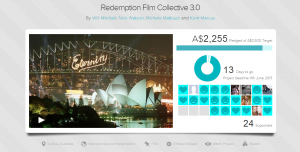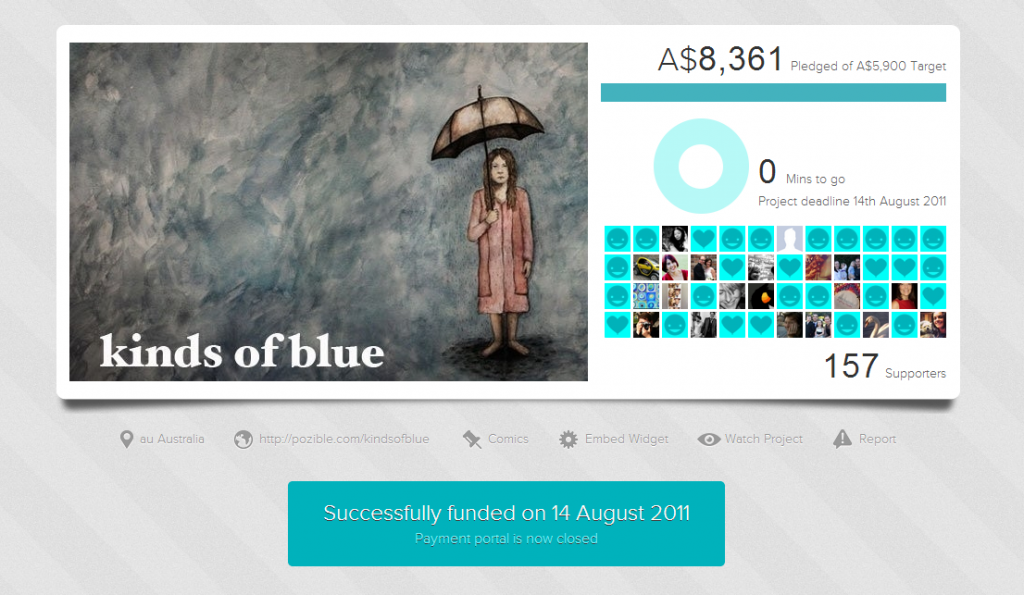Thursday 30 May 2013
Christians are always fundraising. Whether someone’s heading off on a mission trip, starting a new ministry, sustaining an old one, releasing an album or launching a creative project, Christians are dependent on the support of their fellow believers to make things happen. And with the growth of online networks, crowdfunding sites are gaining popularity and helping Christians use their existing networks to raise support.
Crowdfunding grew out of crowdsourcing, the online gathering of a group of people to build a better product through collective intelligence. It could be as simple as a brand asking consumers what their new product should be called, or a footy team asking their fans what colour their new jerseys should be, with the end result reflecting the majority response. Wikipedia is also an example of crowdsourcing.
Crowdfunding uses a similar strategy, but with the purpose of raising funds. Websites like Pozible and Kickstarter allow people with great ideas but no money to bring their idea to the public, and offer incentives to those who support the project. Independent film makers, musicians and community organisations are the most common users of crowdfunding platforms.
A recent example is the campaign to turn cult TV series Veronica Mars into a movie. The campaign was the fastest Kickstarter project ever to raise $1 million. Fans were offered free merchandise and private screenings as incentives, with one person being given a speaking role in the movie after donating $10,000. As of mid-April, the project had raised more than US$5.7 million , that’s $3 million more than they aimed for. Similarly, Christian movie Blue Like Jazz, based on the book by Don Miller, attracted 4,495 backers on Kickstarter who pledged $345,992 to bring it to the big screen last year.
The advantage of crowdfunding is not just the ability to raise money relatively simply, but the supporter base you come away with. Often the very act of supporting a project generates loyalty in the supporter, as they feel part of making it happen. In marketing speak, these supporters are your “tribe”, and very valuable to the long-term success of your project.
The down-side to the mainstream crowdfunding sites is that unless you reach your goal, you don’t receive the money. This is designed to push people to work hard at marketing their projects and offer quality incentives to those who donate. For an artist looking to record an album, this might mean giving a signed copy of the album delivered free to every basic supporter, or offering a free intimate gig for a top level supporter.
For Christians, crowdfunding can provide a way to give a project or ministry a public profile as friends share the campaign through social media, as well as help raise much-needed funds to get the ministry project off the ground.
 A recent example of Christians using crowdfunding is the Redemption Film Collective, a group of Australian Christian filmmakers who are trying to raise money to fund their entry into an international Christian film competition. Video editor, Nick Watson says they opted for the crowdfunding platform because of its reach.
A recent example of Christians using crowdfunding is the Redemption Film Collective, a group of Australian Christian filmmakers who are trying to raise money to fund their entry into an international Christian film competition. Video editor, Nick Watson says they opted for the crowdfunding platform because of its reach.
“It’s an easy way to communicate with a whole heap of people that you’re doing this project and they can all pitch in and pledge. It’s a good way for them also to see how the funding is going and as a group share in an event and making this thing happen.”
At the time of writing, the group’s goal of $2500 is around 90 per cent with just over a week to go. Nick says it’s been a bit of a stressful process because the competition is running at the same time.
“It has caused us a bit of stress because we’ve actually been doing the production while the fundraising has been happening. So we’ve been spending this money and we don’t even know if we’re going to raise the funds. But a big clincher was a few days before the actual shoot happened, a few people put in big donations which brought us up to about 80 per cent.”
Interestingly, most of the big donations have come from unlikely places, including non-Christian friends and family.
Nick says another appeal of crowdfunding is the way users can choose how involved they are, from reading every update and watching teaser videos, so just donating and leaving it at that. In contrast to other Christian methods of fundraising which rely on people reading large swathes of text, Nick thinks it’s a good format. But he says it might not work as well for less-tangible projects.
“I would probably recommend it for specific things. It’s a rewards based system, so it particularly works well for film or for products where there’s something at the end of it for people to experience or have.”
The Bible Society also has its own form of crowdfunding, run through its Towards the Goal site, where charities can raise money for campaigns like Bike for Bibles.
Eternity’s own Guan Un used crowdfunding when he and some friends set about printing a comic book about depression back in 2011. Kinds of Blue reached its fundraising target of $5,900 within 48 hours, a remarkably short time. The project ended up raising more than $8,000 and the first print run has gone on to sell out.

Guan says the success of the project is due mostly to the power of social media.
“I do put it down to firstly, people finding something that was tangibly and identifiably good that they could support, and share with others. Secondly, that it was really easy for us to share with people, and for them to share it with others – through social media.”
The team also had the clout of a comic-book celebrity behind them who shared their project on Twitter and bought a copy. Guan says the fact Kinds of Blue was already finished and available to read online before anyone chose to pledge support was a big factor.
“All the comics were up on the site to read, and all that was left was printing. It can be harder with some of the crowdfunding projects which don’t seem to show much ‘proof’ of what they want to do.”
For Christians looking for a simpler or faith-based platform, there are a number of Christian crowdfunding sites which allow users to keep whatever they raise, regardless of their goal. Faithfunder and Faithlauncher both have this policy.
But crowdsourcing doesn’t always go so well. Recently the Sydney Powerhouse Museum ran a competition for members of the public to design a poster for the Sydney Design Festival. However, the competition went down like a lead balloon when professional designers, insulted at the idea of cheapening such a normally prestigious opportunity, submitted satirical fake entries. Nevertheless, crowdsourcing continues to be a popular platform for those willing to risk all to reach their goal.
Top image: http://www.flickr.com/photos/howardlake/4986290249/sizes/l/in/photostream/
Email This Story
Why not send this to a friend?
